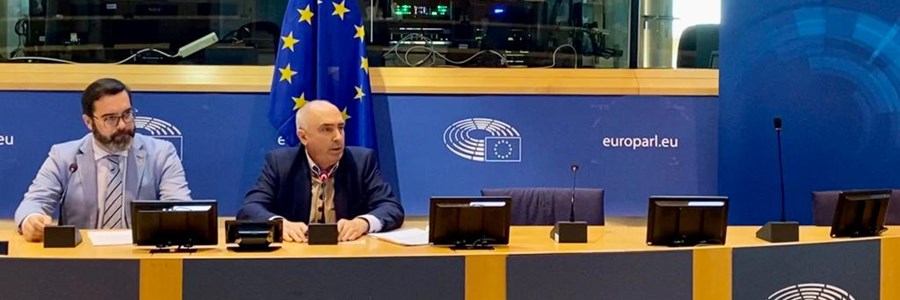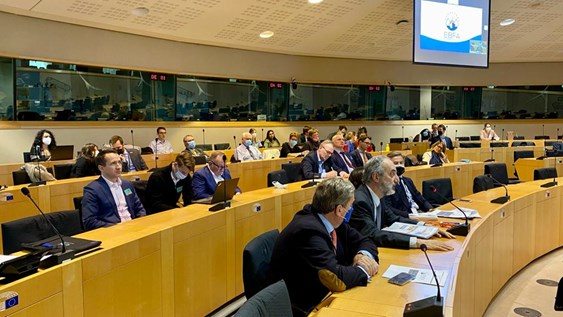Launch of European Bottom Fishing Alliance in the European Parliament

Today, fishing organisations from 14 EU countries representing over 20 000 fishers and 7 000 vessels, launched in the European Parliament the European Bottom Fishings Alliance (EBFA). Representatives of the alliance presented the reality of these fisheries across Europe and defended the use of active bottom gears as a sustainable activity. The press conference hosted by the first vice-chair of the Committee on Fisheries, MEP Peter van Dalen, drew political attention over the valuable contribution of these fleets in stark contrast with the negative perception expressed by the European Commission towards bottom gears. Decision-makers present fueled concerns over possible implications of phasing out bottom contacting gears in the upcoming EU Action Plan to further protect fisheries resources and marine ecosystems in the context of EU’s 2030 Biodiversity Strategy.
The alliance showcased the sustainability and overall importance of these widespread fishing methods in all EU member states which bring ashore more than one million tons of healthy and sustainable seafood annually. This represents 25% of the total EU landings and generates almost 40% of the total revenue of the sector, contributing to the wealth, employment, and industrial fabric of many coastal and peripheral communities. The sector reminded that these fisheries are well regulated, controlled, researched and widely certified.
According to the EBFA, all these achievements can go down the drain if the announced Action Plan, in line with the European Commission Biodiversity strategy, gradually restricts and eventually phases out the use of bottom contacting fishing gears.
Iván López van der Veen, chair of the EBFA, declared: “We are ready to fight with science and data all the myths surrounding our activities. We have mapped the seas to identify vulnerable areas, we have closed fishing grounds when and where need. Our vessels are more selective, use less impacting techniques and have reduced fuel consumption. We call on EU authorities to continue investing in science, management and innovation. Phasing out bottom gears is not the answer, particularly if the EU is serious on the need to reduce dependencies on imported food products”.

Some environmental organisations and even the European Commission are questioning the sustainability of these gears, identifying active bottom gears such as bottom trawling as “the most damaging activity to the seabed”. The EBFA argues that according to scientists, ocean warming, acidification, and sea level rise are the main threats to the marine environment, not fishing. Closing off parts of the ocean to fishing will not solve the problems.
Mr López commented: “Trawling to catch fish certainly has an environmental impact, nobody denies that. Everything we eat costs the planet something. But thanks to effective, science-based management, the EU and the sector strive to sustainably harvest fish with the minimum impact. Besides, bottom fishing activities are nowadays pretty much fenced to historical fishing grounds”. He concluded: “We can do better and we will do better, but we need policies based on factual, scientific and peer-reviewed evidence and comprehensive impact assessments. We call on the EU to establish clear channels for the fleet to participate In the scientific and technical efforts as equals and experts. The sector wants to develop a higher level of trust and transparency In our activities to underpin our social license. To phase out perfectly legal fishing gears will not help oceans’ health nor fishers”.
The EBFA reminded that the good state of demersal fish stocks in the Atlantic has proven that effective fisheries management is the best tool for successful conservation, recovery and sustainable use of marine resources. Even more if, according to science, seabed status is high in regions where fisheries are exploited sustainably.
The EBFA concluded that the Commission cannot sacrifice sustainable and certified EU fisheries to please a few environmental organisations while at the same time still accepting large scale imports from non-EU bottom trawling fisheries.
_____________________________________________________________
Press contact: Daniel Voces, +32 2 230 48 48 daniel.voces@europeche.org
Sources: Europêche/EBFA
Attachments:
Tags: EBFA, bottom fishing, Action Plan, european parliament, fisheries, marine ecosystems, biodiversity strategy, sustainable seafood, employment, communities, Science, selective, fuel consumption, Innovation, impact assessment